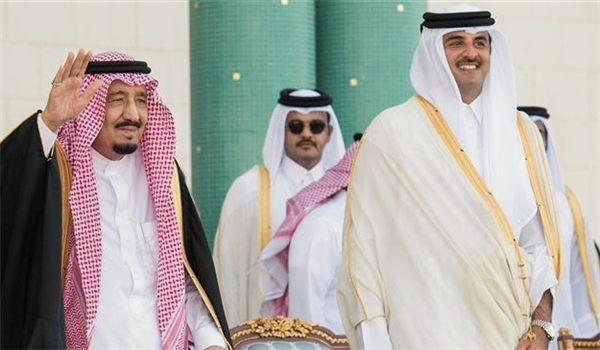
RNA - The Arabic-language Al-Ahd newspaper quoted Mujtahid as saying that Saudi Crown Prince Mohammed bin Salman has met and talked with one of the Saudi figures of Al Thani family on July 24 to discuss ways for overthrowing the Qatari Emir.
He added that the identity of the Qatari figure wasn’t revealed before the Saudi king entrusted Sheikh Abdollah bin Ali Al Thani with the responsibility of affairs related to the Qatari Hajj pilgrims last Wednesday.
A leading Arab daily disclosed on Sunday that Riyadh plans to establish an operations room for the Qatari opposition groups after relations between the two Arab states darkened in the past few months.
According to Rai al-Youm newspaper, Sheikh Abdollah bin Ali Al Thani said that Saudi King Salman has allowed him to form a special operations room aimed at what he called as "giving service to the Qatari people".
He wrote on his twitter page that he had met with King Salman in Tangier in Morocco.
Al Thani said that the operations room will study and meet the demands of the Qatari Hajj pilgrims and citizens in Saudi Arabia and other world states and the Saudi employees will register their names and phone numbers.
According to the newspaper, observers believe that the operations room is most possibly created to pave the ground for the activities of Qatari opposition figures like what was formed for their Syrian counterparts in Jordan and Istanbul.
"Saudi Arabia's approach towards Sheikh Abdollah bin Ali and other Qatari opposition figures who join the operations room will be like a government in exile," they added.
Bahrain, Saudi Arabia, the United Arab Emirates and Egypt cut off diplomatic ties with Qatar early June, and suspended air and sea communication one week after the Arab Islamic American Summit in Riyadh, accusing Doha of supporting terrorist organizations and destabilizing the situation in the Middle East.
Qatar rejected claims by a Saudi-led bloc of countries that it “finances terrorism” and intervenes in their internal affairs.
After more than two weeks, on June 22, the Saudi-led bloc gave Qatar a 10 days to comply with 13 demands, which included shutting down the Al-Jazeera Media Network, closing a Turkish military base and scaling down ties with Iran.
Through Kuwait, which has been acting as intermediary, Qatar officially responded to the new deadline, as Doha stressed that the demands by Saudi Arabia and its allies were impossible to meet.
Foreign Ministers from the bloc of countries boycotting Qatar released a statement, saying Doha’s rejection of the demands “proved” its link with terrorism. Top diplomats of the boycotting countries also added that the list of the collective demands was now void and they pledged further political, economic, and legal steps against Qatar.
Qatar had announced that Doha would not meet any of the 13 demands made by Saudi Arabia and its allies, offering instead "a proper condition for a dialogue" to resolve the [Persian] Gulf crisis, accused Saudi Arabia and its regional allies of "demanding that we must surrender our sovereignty as the price for ending the siege".
But Riyadh reiterated that its demands to Qatar to end the stand-off in the [Persian] Gulf were "non-negotiable".
Qatar is supported by Turkey and Iran as Ankara and Tehran have stepped in to provide fresh produce, poultry and dairy products to Doha, while Russia stressed that Moscow would do "everything possible" to help resolve the crisis. The US, UK and other Western countries have also dispatched senior envoys to the region to press both sides to resolve the dispute.
The split among the Arab states erupted after US President Donald Trump visited Riyadh where he accused Iran of "destabilizing interventions" in Arab lands.
847/940